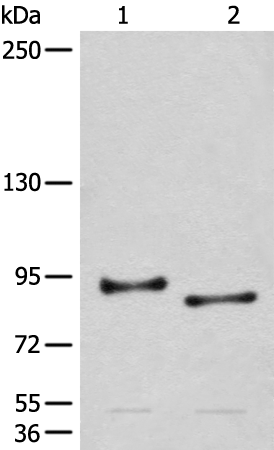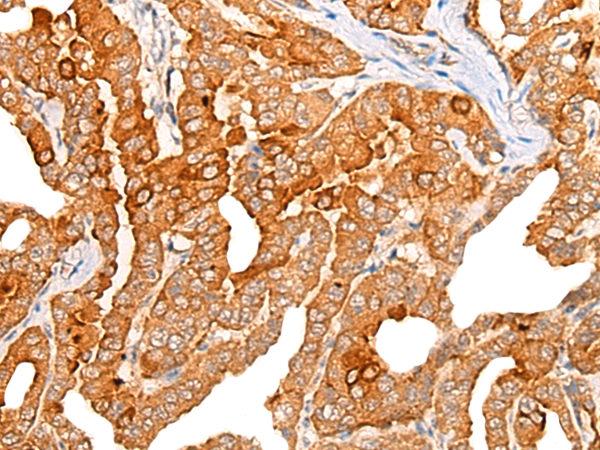

| WB | 咨询技术 | Human,Mouse,Rat |
| IF | 咨询技术 | Human,Mouse,Rat |
| IHC | 1/25-1/100 | Human,Mouse,Rat |
| ICC | 技术咨询 | Human,Mouse,Rat |
| FCM | 咨询技术 | Human,Mouse,Rat |
| Elisa | 1/5000-1/10000 | Human,Mouse,Rat |
| WB Predicted band size | 102 kDa |
| Host/Isotype | Rabbit IgG |
| Antibody Type | Primary antibody |
| Storage | Store at 4°C short term. Aliquot and store at -20°C long term. Avoid freeze/thaw cycles. |
| Species Reactivity | Human, Mouse, Rat |
| Immunogen | Fusion protein of human CHRD |
| Formulation | Purified antibody in PBS with 0.05% sodium azide and 50% glycerol. |
+ +
以下是关于Chordin(CHRD)抗体的3篇示例文献参考(请注意文献为示例性质,实际引用请核实原文):
1. **"Chordin regulates BMP signaling in zebrafish embryonic development"**
- 作者:De Robertis, E.M., et al.
- 摘要:研究利用Chordin特异性抗体通过免疫沉淀和免疫荧光技术,揭示Chordin在斑马鱼胚胎中调控BMP信号的空间分布,证明其对抗体阻断后导致背腹轴发育异常。
2. **"Antibody-based detection of Chordin in cancer-associated BMP signaling pathways"**
- 作者:Sakai, L.Y., & Ramirez, F.
- 摘要:报道了一种高特异性Chordin抗体的开发,用于Western blot和免疫组化分析,发现Chordin在多种肿瘤微环境中表达下调,可能通过BMP信号异常促进癌细胞侵袭。
3. **"Functional characterization of Chrodin-neutralizing antibodies in Xenopus models"**
- 作者:Khokha, M.K., et al.
- 摘要:通过抗体制备和功能实验,证明Chordin中和抗体可模拟BMP信号激活表型,应用于非洲爪蟾胚胎研究,验证其在早期中胚层分化中的关键作用。
**注意事项**:以上文献信息为模拟示例,实际研究中请通过PubMed或Google Scholar检索真实文献(如关键词:Chordin antibody BMP signaling)。部分经典研究可能发表于2000年代早期,需结合最新进展引用。
Chordin (CHRD) is a secreted glycoprotein that plays a critical role in embryonic development, particularly in dorsal-ventral axis formation. It acts as a bone morphogenetic protein (BMP) antagonist by binding to BMPs (e.g., BMP4) via cysteine-rich domains, preventing their interaction with cell surface receptors. This inhibition is essential for establishing neural tissue and patterning the early embryo, as demonstrated in model organisms like Xenopus and zebrafish. Chordin's activity is regulated by proteolytic cleavage (e.g., by Tolloid metalloproteases) and interactions with other BMP modulators (e.g., Noggin, Follistatin).
Antibodies targeting Chordin are widely used in developmental biology and disease research. They enable detection of Chordin expression in tissues (via immunohistochemistry, Western blot) and analysis of its localization/function during embryogenesis. In disease contexts, Chordin dysregulation has been implicated in cancer progression, skeletal disorders, and fibrosis. For example, reduced Chordin levels are associated with BMP pathway activation in certain cancers, while mutations link to brachydactyly syndromes. Anti-Chordin antibodies also facilitate mechanistic studies in BMP/TGF-β signaling pathways and evaluation of therapeutic interventions in preclinical models. Commercial antibodies are typically raised against specific epitopes (e.g., N-terminal domain) and validated for cross-reactivity across species (human, mouse, rat).
×